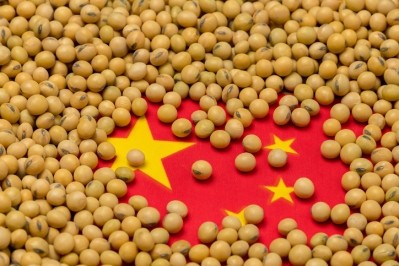China’s oilseed imports drop as ASF cuts swine herd

The US Department of Agriculture (USDA) released details of China’s projected drop in feed needs for oilseeds in an attaché’s report.
Imports for the feed ingredients are anticipated to continue to fall as China deals with the ASF spread, the attaché said.
“The sizable decrease in MY18/19 and MY19/20 soybean imports is due to reduced feed demand as a result of African Swine Fever (ASF) in China beginning in August 2018,” she said. “The disease has caused a significant decline in sow and hog inventories, thereby reducing demand for soybean meal for feed. This situation is expected to continue through 2019 and into 2020.”
By March 2019, the numbers of sows and hogs were reported to have dropped by 21% and 18.8%, respectively, compared to the same time the previous year, she said. Industry estimates suggest that the hog inventory could drop 30% in 2019 and need up to two years to recover.
“Many farmers are reluctant to rebuild their swine stocks,” she added.
There also has been a change in the origin of the oilseeds imported as China has shifted to buying more soybeans from Brazil and Argentina while cutting imports from the US, the USDA reported.
Oilseeds and feed ingredient imports
Overall, China’s import of soybeans is anticipated to drop to 84m metric tons (MMT) during the 2018/19 marketing year and drop to 83m metric tons the following year, the attaché said. In marketing year 2017/18, the country imported 94.1m metric tons.
“China imported 34.8 MMT of soybeans during the first half of MY18/19, a 7.8 MMT reduction as compared to average imports during the first half of the previous two years,” she said. “Low imports in the first half of MY18/19 have led to reductions in both the state reserve and industry stocks.”
“It is estimated that soybean imports during the second half of MY18/19 will be below 50 MMT compared to an average of 51 MMT during the same period of the previous two years,” she added.
Similarly, canola seed imports from Canada are anticipated to drop about 40% during the latter half of the current marketing year, she said. However, the drop is being attributed to phytosanitary questions.
“Imports of Canadian rapeseed meal are also impacted, with imports down to 0.95 MMT in MY18/19,” the attaché said.
Oilseed use and feed production
The disease-related reduction in swine herds has been followed by a drop in feed demand, the attaché said. “Swine feed production will be down by an estimated 18.9 MMT in MY18/19, based on a 4.7 MMT reduction in pork production, with the majority of the decrease occurring in the second half of the year,” she added.
The use of soybean meal in feed is anticipated to fall to about 65.5m metric tons during the 2018/19 marketing year, the attaché said. The amount used is predicted to see additional reductions the following year.
“China’s total compound feed demand will be down by an estimated 14.4 MMT in MY18/19 compared to the previous year,” she said. “This decrease is based on a decrease in pork production, partially offset by a moderate increase in the production of poultry, eggs, beef, mutton, milk, and cultured seafood products.”
In 2018, total feed production was about 228m metric tons – an increase of about 2.8% from the previous year – and the production of compound feed also grew during that period, she said.
Both the China Feed Industry Association and industry analysts anticipate that total feed production will fall in 2019, despite the offsetting increase in feed production for poultry, ruminants and aquaculture species, she said. However, there is some debate on how much of a drop is anticipated with the industry association predicting a reduction in swine feed of about 6.5% and others suggesting it will drop 27% with total feed production falling 11.6%.
As the demand for animal-based proteins is expected to remain high in China, the reduction in pork production is expected to support moderate growth in production of other livestock species during 2018/19 and 2019/20, the attaché said.
Asking for market access
Two of Canada’s largest canola exporters lost the ability to export canola seeds to China in March, reported the Canola Council of Canada.
However, importers also have stopped buying the oilseed from other exporters in Canada, Brian Innes, VP of public affairs with the council, told us previously. “When we look at the amount of tonnage, China as a seed market represents almost a quarter of our overall production in Canada [and] we produce approximately 21m tons a year of canola,” he added.
The region has been a continual growth market for Canadian producers for the last decade, he said. China has raised questions about some phytosanitary issues in relation to canola seed imports, but the quality of the crop is not considered to have changed.
“It’s of top quality and the issues raised by China around weed seeds – we’ve not seen any evidence to suggest that there would be any concern about weed seeds in Canadian canola,” he said. “In fact, some of the species raised by China we have no evidence of them being found in Canada.”
The producer organization has asked for a delegation to visit Canada to address the issue and reopen the market, but the halt on imports remains, the council reported.
Similarly, US soybean producers have been calling for an end to a period of trade uncertainty.
Before the disease outbreak and the ongoing trade tensions between the US and China, soybean producers exported about $12.4bn worth of the crop to China to meet feed needs, according to information from the American Soybean Association (ASA).













